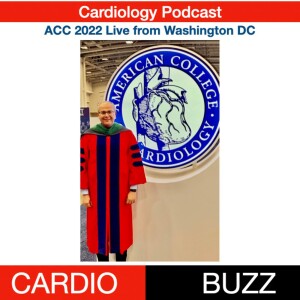
Saturday Apr 09, 2022
15: Live from Washington DC. What were the top trials in ACC 2022?
Washington was calm, cold, and rainy in the first days of Ramadan but it was totally worth it because the American college of cardiology ACC meeting was back in person after two years of virtual attendance.In this episode of cardio buzz, we are bringing you, what we think are, the best late-breaking trials announced in the ACC meeting last week. More than 20 trials were announced as late-breaking as well as another bunch of featured clinical research. I decided to choose only 5 trials to present here. Choosing the top 5 articles was challenging. I chose the ones that I felt will have a bigger impact on your practice, bring in newer concepts, or change our views on medicine in general.Let’s start the count downNumber 5; PROMPT-HFElectronic medical records changed the way we practice medicine. They have obvious advantages but I can’t hide the fact that it makes us spend more time with screens than with patients. However, these electronic systems can prove useful in other aspects. By nudging the doctors, we might improve our prescription habits and overcome our inertia in prescribing medications or up titrating them. And one of the domains in which inertia is clear is heart failure. GDMT is under-prescribed in patients with heart failure. We usually don’t prescribe the 4 essential medications and we rarely up titrate them to the maximum tolerable dose. And the PROMPT-HF trial was not a study on patients, it was a study on doctors. 100 healthcare providers, caring for patients with HFrEF in the outpatient were randomized to either an alert or usual care. one-third of them were not physicians. The alert started working at the moment of prescribing medications. It highlighted the patients’ creatinine, potassium, blood pressure, eGFR, heart rate, and EF. The system notified providers of missing medications and the need to build up the dose. The electronic alerts increased GDMT prescription by >40% and were highly significant for beta clockers. 79% of alerted doctors agreed that the alert was effective at enabling improved prescription of medical therapy for HF. This low-cost intervention can be rapidly integrated into clinical care and accelerate the adoption of high-value therapies for heart failure. So next time, don’t be angry when the system alerts you to the need of increasing the beta-blocker dose.Number 4 CHAP trial Treating mild chronic hypertension during pregnancy.We know that treating hypertension does prevent strokes, MI, and heart failure but the situation in pregnancy is more complicated. Unless hypertension is severe and complicated by eclampsia, we did not have evidence that treating hypertension can improve pregnancy outcomes given the potential hazards of the drugs on the fetus. The CHAP trial enrolled 2,408 women with mild chronic hypertension (
No comments yet. Be the first to say something!